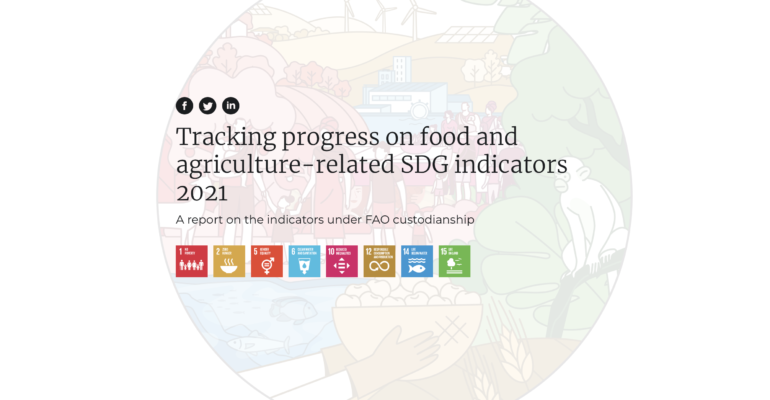Liliana Mosca, SI United Nations (UN) Representative, Rome, discusses the Food and Agricultural Organization (FAO) report on the indicators under FAO custodianship (1, 2,5,6,10,12,14,15)
The UN Secretary-General convened a UN Food Systems Summit (UNFSS) as part of the Decade of Action to achieve the Sustainable Development Goals (SDGs) by 2030, held on 23 September 2021.
The UNFSS aimed to increase global awareness and stimulate actions to transform food systems, eradicate hunger, reduce food-related diseases and heal the planet. The event was preceded by the publication of the new FAO report “Tracking progress on food and agriculture-related SDG indicators 2021”.
The FAO report shows that “Covid-19 pandemic has made it harder to achieve the Sustainable Development Goals (SDGs), undermining decades of development work.
The analysis, “Tracking progress on food and agriculture SDG-related indicators”, focuses on eight of the SDGs (1, 2, 5, 6, 10, 12, 14 e 15), which were adopted at a UN Summit in New York in 2015.
The main findings of which show the world is falling behind, or at best, making negligible progress. According to the report, the COVID-19 pandemic may have pushed an additional 83 to 132 million people into chronic hunger during 2020, making the target of ending hunger even more distant.
Around 14 percent of all food is lost along the supply chain, before it even reaches the consumer, which FAO considers “an unacceptably high proportion”. Progress has also faltered in maintaining plant and animal genetic diversity for food and agriculture.
Agricultural systems bear the brunt of economic losses due to disasters, small-scale food producers remain disadvantaged, and food price volatility has also increased, due to the constraints placed by the pandemic and lockdowns.
The report additionally focuses on gender, finding that women producers in developing countries earn less than men even when more productive; gender inequalities in land rights are pervasive; and discriminatory laws and customs remain obstacles to women’s tenure rights. Lastly, water stress remains alarmingly high in many regions, threatening progress towards sustainable development.
However, the FAO report indicates several areas in which progress is being made: from implementing measures against illegal practices, and unreported and unregulated (IUU) fishing; to sustainable forest management; eliminating agricultural export subsidies; increasing investment to boost agricultural productivity in developing countries; and duty-free access for developing and Least Developed Countries (LDCs), particularly for agricultural products. The report also includes a special Chapter on measuring the contribution to the SDGs of the private sector, which FAO regards as playing a key role.
The report details plans for the future by referring to the necessity to scale-up investment in agriculture, to more access to new technologies, and services and information resources for farmers, with support to small-scale food producers.
The FAO also supports the conservation of plant and animal genetic resources, measures to counter food price volatility, and prevent potentially hazardous events from becoming full-blown disasters. It also calls for more action to use water efficiently, better interventions to reduce food losses, more protection of ecosystems, progress on the legal and practical aspects of women’s land rights and the sustainability of global fisheries.
Finally, the report makes an urgent call for more and better data. “As the COVID-19 pandemic continues to unfold, and the world moves further off track in meeting the 2030 SDG deadline, timely and high-quality data are more essential than ever,” Pietro Gennari, Chief Statistician said.

